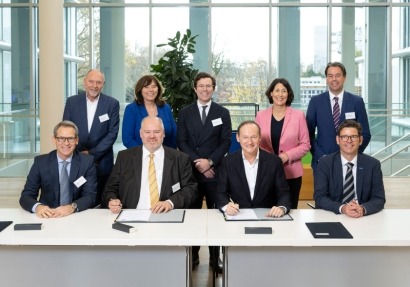
The surrounding urban centers of Frankenthal and Ludwigshafen also stand to benefit from the sustainable heat and are participating in the necessary seismic surveys as a first step. In order to make optimal use of synergy effects from the project, Vulcan plans to build a lithium extraction plant for the production of green lithium.
The geology of the Upper Rhine Graben gives the Rhine Valley region enormous geothermal potential. Assuming that the exploratory work is successful, heat pumps could be used to take advantage of the area’s geothermal energy to generate CO2-free steam.
With a potential output of 300 megawatts of thermal energy, around 4 million metric tons of this crucial energy carrier for the chemical industry could be produced at the BASF site in Ludwigshafen every year – without the use of fossil fuels. This would prevent the emission of approximately 800,000 metric tons of CO₂, making a significant contribution to reducing greenhouse gas emissions at BASF’s main site.
In addition to providing renewable heat, Vulcan plans to produce sustainable lithium for the German and European battery and automotive industries as part of the project. The geothermally heated water in the Upper Rhine Graben boasts a high concentration of this light metal, which is mainly used to produce lithium-ion batteries for applications such as smartphones, laptops, and electric cars.
BASF would first use the hot thermal water to generate steam, Vulcan would then extract lithium using a resource-efficient process known as adsorption-type direct lithium extraction (A-DLE). With this in mind, the two partners are currently examining the possibility of building a lithium extraction plant at BASF’s site at a later date.
Besides its potential for industrial use, deep geothermal energy also offers opportunities for generating district heating. Harnessing this energy could constitute an important step on the road to a successful heat transition at a municipal level. Vulcan and BASF are therefore working together with regional energy suppliers – Technische Werke Ludwigshafen and Stadtwerke Frankenthal – to evaluate whether the geothermal energy made available through the project can be used to supply low-emission heating for households in the two urban areas they serve.
“We want to supply our Ludwigshafen site with CO2-free steam in the future. In addition to harnessing the waste heat from our production facilities, where possible, we want to consider renewable heat sources from geothermal structures,” says Uwe Liebelt, President European Verbund Sites, BASF SE.
“With this project, Vulcan aims to make a significant contribution to reducing CO₂ emissions from the region’s industrial sector. Supplying energy from renewable heat sources to the companies located in the Upper Rhine Valley is a cornerstone of our project development strategy. Our aim is to realize project models like this one with BASF that will allow us to both harness geothermal energy and extract carbon-neutral lithium along the length of the Upper Rhine Valley. The associated reliable supply of heating for the region’s population would also deliver an important locational advantage,” explains Thorsten Weimann, Chief Development Officer at Vulcan Energie Ressourcen GmbH.
The next step is to carry out a seismic survey to investigate the geothermal conditions in a subregion of the Upper Rhine Graben. Vulcan will be the active project developer, carrying out the exploration and acting as the technical lead. The initial exploratory work is currently scheduled to begin in early 2025.
PHOTO: Front row left to right: Meinhard Grodde, Head of Legal and Compliance, Vulcan Energie, Thorsten Weimann, Managing Director and Chief Development Officer, Vulcan Energie, Uwe Liebelt, President European Verbund Sites at BASF, Tilmann Hezel, Senior Vice President Infrastructure at BASF.
Back row left to right: Horst Kreuter, Co-Founder and Chief Representative, Vulcan Energie, Jutta Steinruck, Mayor City of Ludwigshafen, Cris Moreno, Managing Director and CEO, Vulcan Energy, Daniela Schmitt, Minister of Economic Affairs Rhineland-Palatinate, Nicolas Meyer, Mayor City of Frankenthal
Photo: BASF SE

